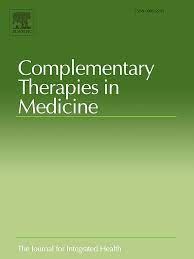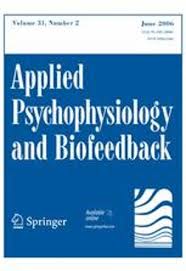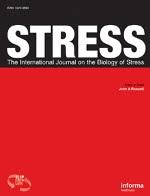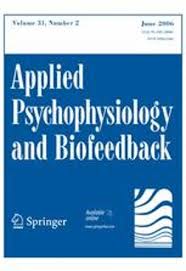Resultaten Onderzoek
U kunt publicaties vinden door te kiezen voor een categorie of een steekwoord. Alle artikelen uit betreffende categorie of met betreffend steekwoord verschijnen dan hier beneden.
Categorieën
Steekwoorden
Categorieën
Steekwoorden
- Toon alle
- ADHD
- Angst/Paniek
- Bloeddruk
- Burnout
- Chronische pijn
- Cognitieve functie
- Cortisol/DHEA
- Dementie
- Depressie
- Diabetes
- Global Coherence
- Hart- & Vaatziekten
- Intuitie & Bewustzijn
- Kanker
- Kinderen/jeugd
- Kosten
- Leiderschap
- Meditatie/Mindfulness
- Metabool syndroom
- Obesitas/eetstoornis
- PTSS
- Schizofrenie
- Slaap & vermoeidheid
- Social Coherence
- Stress
- Veerkracht
- Wetenschap HRV & Coherentie
- Zwangerschap
Heart rate variability biofeedback in chronic disease management: A systematic review

Background: Heart rate variability biofeedback (HRVB) is a non-pharmacological intervention used in the management of chronic diseases.
Method: A systematic search was performed according to eligibility criteria including adult chronic patients, HRVB as main treatment with or without control conditions, and psychophysiological outcomes as dependent variables.
Results: In total, 29 articles were included. Reported results showed the feasibility of HRVB in chronic patients without adverse effects.
Heart Rate Variability Biofeedback Improves Emotional and Physical Health and Performance: A Systematic Review and Meta Analysis

We performed a systematic and meta analytic review of heart rate variability biofeedback (HRVB) for various symptoms and human functioning. We analyzed all problems addressed by HRVB and all outcome measures in all studies, whether or not relevant to the studied population, among randomly controlled studies. Targets included various biological and psy-chological problems and issues with athletic, cognitive, and artistic performance. Our initial review yielded 1868 papers, from which 58 met inclusion criteria. A significant small to moderate effect size was found favoring HRVB, which does not differ from that of other effective treatments. With
lees verder...Heart Rate Variability, Health and Well-Being: A Systems Perspective

The development of a new tool, analytic device, or approach frequently facilitates rapid growth in scientific understanding, although the process is seldom linear. The study of heart rate variability (HRV) defined as the extent to which beat-to-beat variation in heart rate varies, is a rapidly maturing paradigm that integrates health and wellness observations across a wide variety of biomedical and psychosocial phenomena and illustrates this nonlinear path of development. The utility of HRV as an analytic and interventive technique goes far beyond its original application as a robust predictor of sudden cardiac death. This Research Topic aims to provide a conceptual
lees verder...Self-Regulatory Biofeedback Training: An Intervention to Reduce School Burnout and Improve Cardiac functioning in college students

With the detrimental relationship between school burnout and physiological and cognitive functioning now well documented, interventions to ameliorate school burnout symptomology are needed. This study examined the effectiveness of a self-regulatory biofeedback intervention program (Heart RateVariability Coherence Biofeedback Training [HRVCB]) in contrast to a protocol demonstrated to produce cognitive and physiological improvements (a high intensity interval training protocol [HIIT]) as well as a wait-list control condition at decreasing school
lees verder...Building Resilience in an Urban Police Department

Objective:The aim of this study is to examine a resilience training intervention that impacts autonomic responses to stress and improves cardiovascular risk, psychological, and physiological outcomes in police. Methods: Officers [(n=38) 22 to 54 years] modified emotional and physical responses to stress using self-regulation. Measurements include psychological and physiological measures [eg, heart rate variability (HRV), blood pressure, C-reactive protein)] obtained at three time intervals. Results: Age was significantly (P<0.05) associated with
lees verder...Coherence: A Novel Nonpharmacological Modality for Lowering Blood Pressure in Hypertensive Patients

This study examined the efficacy of teaching emotional self-regulation techniques supported by heart rhythm coherence training (emWave Personal Stress Reliever) as a means to quickly lower blood pressure (BP) in patients diagnosed with hyperten-sion. Previous studies have demonstrated systemic reductions in BP in both high stress populations and patients diagnosed with hypertension using this approach, but to the best of our knowledge, an investigation of their ability to produce immediate
lees verder...New Hope for Correctional Officers: An Innovative Program for Reducing Stress and Health Risks

This study investigated the impact of a new stress management program on physiological and psychological stress and health risk factors among 75 correctional officers. The experimental group received training in emotion self-regulation techniques intended to reduce stress and health risk factors. Practice of the techniques was enhanced by heart rate variability feedback, which helped participants learn and sustain use of the self-management tools. Measures of physiological stress included cortisol, DHEA, cholesterol, triglycerides, fasting glucose
lees verder...The Effects of Emotions on Short-Term Power Spectrum Analysis of Heart Rate Variability

Introduction: This study utilizes HRV analysis to examine a new method of intentionally shifting emotional states, and demonstrates that positive emotions lead to alterations in sympathovagal balance that may be beneficial in the treatment of hypertension. Anger, on the other hand, was shown to significantly increase sympathetic activation.
Summary: Salivary IgA, heart rate and mood were measured in thirty individuals before and after experiencing care or anger. Two methods
